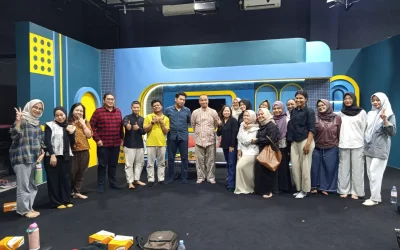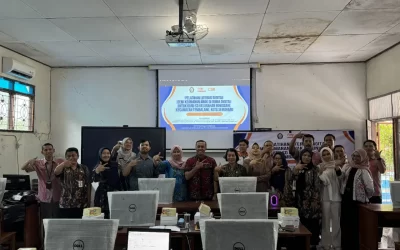Semarang, 2025 — When personal experience transforms into meaningful academic research, it is exemplified in the journey of Hanun, a graduate of the International Undergraduate Program in Communication Science at Diponegoro University. Drawing from her exchange experience in South Korea, Hanun explored the identity dynamics of hijabi Muslim women within a society that is culturally and visually homogenous. Through her thesis titled “Understanding the Identity, Negotiation, and Cultural Adaptation of Muslim Students with Hijab in South Korea”, she documented the experiences and identity struggles of Muslims in intercultural spaces.
Her experience as an exchange student became the foundation for a thesis topic that was both deep and challenging. As a hijabi woman in South Korea, she stood out visually and was often immediately recognized as a foreigner. Daily life included unfamiliar stares, social distance, and questions about her religion and use of the hijab.
She explained that the perception and attitudes of South Korean society toward hijabi Muslim women are influenced by global narratives, particularly Western media portrayals that often depict Muslims negatively. While Western-looking foreigners were generally received with enthusiasm, as a Southeast Asian hijabi woman, she often encountered more awkward and distanced responses. These experiences motivated her to examine how Indonesian hijabi students navigate their identity in academic and social environments filled with cultural challenges.

In her thesis, Hanun applied an interpretative phenomenological approach to explore the personal experiences of seven Indonesian hijabi students studying in South Korea. The data collection process was not without obstacles, especially in coordinating schedules and locating participants. Due to the limited number of hijabi students who had studied in Korea, she relied on networking from her exchange program to connect with potential informants.
With support from her thesis advisor and insights gained from courses such as Qualitative Communication Research Methods and Intercultural Communication, she was greatly assisted in completing her research. These courses introduced her to various analytical approaches such as reception analysis, semiotics, phenomenology, and framing analysis. Ultimately, she chose interpretative phenomenology for its ability to deeply uncover meaning and personal experience.
Her findings revealed that the challenges most frequently faced by hijabi students in Korea were subtle forms of microaggression, including unfriendly stares, social exclusion, and seemingly intimidating questions. Some respondents coped by adjusting their hijab style to appear less conservative, choosing social circles that avoided alcohol consumption, and learning Korean independently to better integrate with local students.
One respondent even had to carefully choose accommodation where the landlord was inclusive and supportive of foreigners to feel safe and accepted while wearing the hijab. These diverse experiences were framed using Identity Negotiation Theory and Intercultural Communication Adaptation, illustrating how hijabi women adapt, adjust, and stay true to their beliefs.

Beyond identity issues, Hanun also emphasized the importance of empathy and intercultural education. She believes that most prejudice stems from a lack of understanding. Instead of reacting with anger, she advocates for educating others about Muslim culture—such as the significance of the hijab and the positive values it represents.
Hanun hopes her research can serve as a form of empowerment for Muslim students, particularly women, who are currently living or planning to live in countries where Muslims are a minority. She aspires for her thesis to be more than just an academic work—it should also serve as a practical guide and source of inspiration. She wants hijabi women to know they are not alone and that there are many ways to stay true to themselves while adapting to their surroundings.
She also shared a motivational message for Communication Science students, especially those uncertain about their thesis topics. She encouraged them to be open to their environment and explore unconventional topics. Her research demonstrates how a communication science background can be combined with sensitivity to social issues and the courage to explore new perspectives.
Hanun’s exploration of hijabi women navigating identity in South Korea shows that communication science can bridge cultures, advocate for representation, and foster cross-cultural understanding—not just in academic contexts, but in ways that create social impact.





0 Comments